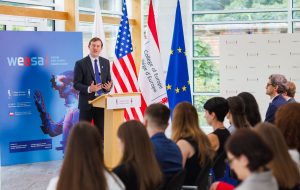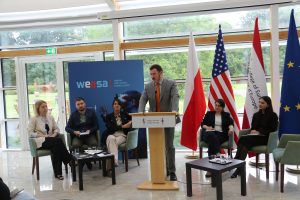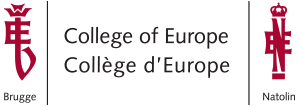21/07/2025
The 13th Edition of the Warsaw Euro-Atlantic Summer Academy (WEASA2025) successfully concluded
This year’s Warsaw Euro-Atlantic Summer Academy (WEASA), held under the theme “Digital Resilience in the Age of Disinformation,” brought together participants from Eastern Europe and the South Caucasus at the College of Europe in Natolin. The objective was to deepen understanding of disinformation as a geopolitical weapon, particularly in fragile democracies, and explore ways to counter the efforts of authoritarian actors seeking to destabilise democratic institutions and erode public trust. Here is the Programme of WEASA 2025.
We welcomed around 30 exceptional mid-career professionals from Armenia, Azerbaijan, Belarus, Georgia, Moldova, and Ukraine. Selected through a highly competitive process, participants coming from various backgrounds (civil society, academia, research, media, and public administration) took part in an intense 7-day summer academy.
During the inauguration of the WEASA2025 the opening remarks were delivered by Mrs Ewa Ośniecka-Tamecka, Vice-Rector of the College of Europe, who encouraged participants to make the most of their time at Natolin, learn from each other, and stay connected through our vibrant alumni network. Our partner, Agnieszka Mazur, Programme Director at the Polish-American Freedom Foundation, warmly welcomed the new cohort and emphasised WEASA’s strength as a sustainable initiative built on strong community bonds. We also had the honour of hosting Michał Baranowski, Deputy Minister of Economic Development and Technology of Poland, who delivered an inspiring keynote titled “Defending Democracy in the Age of Deception: Poland’s Perspective on Hybrid Threats and Transatlantic Resilience.”

As in previous years, the WEASA programme included various formats to engage participants, including popular fireside chats with two exceptional interventions this year. The first one featured Philip Bednarchyk, Head of the GMF Warsaw Office, who shared insightful reflections on the role of the U.S. and the transatlantic relationship in the Eastern Partnership region. The second fireside chat was held with Dominik P. JANKOWSKI, Director of the Economics & Security Committee at the NATO Parliamentary Assembly, who returned to Natolin to offered personal insights into NATO’s evolving role amid hybrid threats.
Panel discussions also remain at the heart of WEASA. This year’s sessions, such as “Is European Integration Still on the Table for the Eastern Partnership?” and “Global Threats to Security: A Multipolar World and Rising Powers,” featured diverse expertise and sparked lively Q&A sessions.
True to its theme, WEASA2025 focused on digital resilience. Sessions on OSINT tools, cybersecurity, algorithms and platforms, as well as disinformation equipped participants with new skills and perspectives to navigate today’s evolving digital, democratic, and transatlantic landscapes.

As is now a WEASA tradition, participants presented the state of play of their countries’ Euro-Atlantic integration paths through SWOT analyses. This session once again proved to be one of the most appreciated elements of the programme, offering valuable insights and fostering peer learning across the region.

The Academy concluded with a dynamic Oxford-style debate on the motion: “This House believes that foreign interference, not internal weakness, is the main cause of democratic backsliding in the Eastern Partnership.” Both sides presented compelling arguments, resulting in a draw – an apt reflection of the complexity of the challenges the region is facing.
 WEASA2025 concluded with a Closing Ceremony, marking the end of an inspiring week of learning, collaboration, and exchange.
WEASA2025 concluded with a Closing Ceremony, marking the end of an inspiring week of learning, collaboration, and exchange.
As part of the final programme, Tatevik Hovhannisyan, WEASA Project and Communications Officer, introduced the WEASA Alumni Network, encouraging participants to stay engaged and connected beyond the Academy. The traditional family photo at the end was the symbol of new beginnings and continuation of a shared journey.
Welcome to WEASA family 🙂

None of this would have been possible without the steadfast support of our long-standing partners: the Polish-American Freedom Foundation and the German Marshall Fund of the United States. Their unwavering commitment to fostering dialogue, leadership, and democratic resilience continues to shape the future of WEASA.



